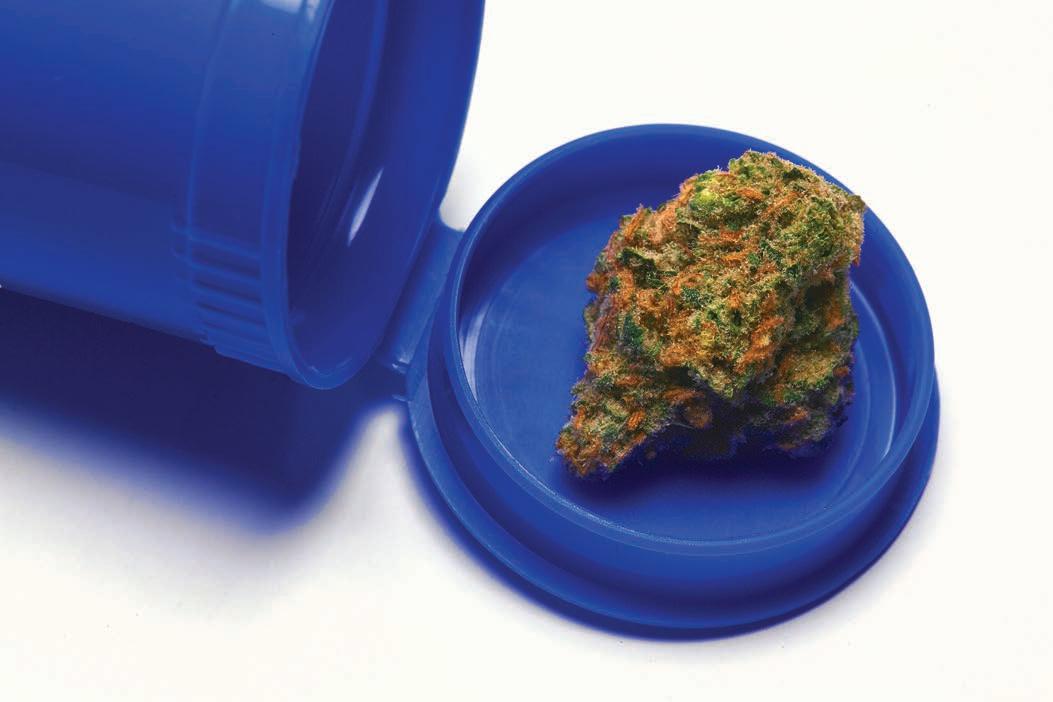
7 minute read
Study eyes weed legalization
Research claims little harm
BY JOHN INGOLD THE COLORADO SUN
Last year, a study came out showing that marijuana legalization in Colorado likely increased cannabis use among adults in the state.
Because of the novel methods the researchers used to examine the question, the study was perhaps the best answer to date on one of legalization’s biggest impacts. But it also left an even bigger question unan-
Guns
Polis will ultimately decide whether the legislation becomes law.
“To have fee switching like that, where you can’t take the risk of going to court to do the right thing — the morally right thing — that’s not right,” Sandy Phillips said. “So we’ve been trying to get it changed, and I think this year we might have a really good shot at having that happen.”
In this July 14, 2015, photo, Sandy Phillips, whose daughter, Jessica Ghawi, was killed in the 2012 Aurora movie theatre massacre, displays a T-shirt memorializing the 12 people killed in the attack outside the Arapahoe County District Court following the day of closing arguments in the trial of the gunman. e swered: Is it bad that more adults are consuming marijuana or doing so more frequently?
Now, in a follow-up study by the same team, using the same methods, the researchers have come to an answer: It doesn’t appear to be.
“At least from the psychological point of view,” said Stephanie Zellers, one of the researchers, “we really didn’t nd that the policies (on cannabis legalization) have a lot of negative in uence, which I think is important.”
Zellers recently graduated with a Ph.D. in psychology from the Uni- victims’ names are, left to right, top to bottom row: Alex Teves, AJ Boik, Alex Sullivan, Gordon Cowden, Jesse Childress, Jessica Ghawi, John Larimer, Jonathan Blunk, Veronica Moser-Sullivan, Rebecca Wingo, Micayla Medek, and Matt McQuinn. (Brennan Linsley, Associated Press le) e Phillipses’ 2014 lawsuit, which was brought in conjunction with and at the urging of the Brady Center to Prevent Gun Violence, didn’t seek monetary damages against the four companies they sued. e couple wanted a court to require the businesses to take steps to prevent their products from being purchased by people who would use them in mass shootings. e Phillipses said they trusted the Brady Center to have their back in the lawsuit, but weren’t fully made aware of the nancial consequences versity of Minnesota, but she began her doctoral work at the University of Colorado before transferring when her thesis adviser changed jobs. She had originally been interested in neuroscience research, but the necessity of using live lab animals for the work was o -putting to her. And, in the Colorado-to-Minnesota connection, she found a trove of data that could be used in neverbefore-tried ways.
The power of twins e data are from longitudinal studies of twins in Colorado or Min- they faced before ultimately being forced to shoulder the defendants’ legal costs themselves. e judge overseeing the case apparently expected Brady to help the Phillipses, too. “It may be presumed that whatever hardship is imposed on the individual plainti s by these awards against them may be ameliorated by the sponsors of this action in their name,” Judge Richard P. Matsch wrote in a motion.
Mike Stankiewicz, a spokesperson for Brady, said it is the organization’s “practice to always inform clients of the risks involved in the cases they le.”
“More importantly, it is egregious that Colorado’s gun industry special protection law requires victims who bring about these lawsuits to pay for attorney and other fees when unsuccessful, which has a chilling e ect on victims who attempt to seek justice,” nesota. Researchers in both states followed the twins over long periods of time, collecting information about their behaviors, including their cannabis use. e survey information, then, creates an ideal scenario for study: It is thorough, it has built-in controls for variables like educational background or socioeconomic status, and it also accounts better than most for genetic di erences.
On top of that, because Colorado has legalized marijuana and Minnesota hasn’t (at least so far) — and
SEE
MARIJUANA, P22
Stankiewicz said.
One of the ammunition providers the Phillipses sued in 2014 was Lucky Gunner. e company recently settled a lawsuit led by victims of the 2018 mass shooting at Santa Fe High School in Texas, where a 17-year-old shooter killed 10 people and wounded 13 others.
“We sued for them to change their business practices,” Sandy said. “Had we been successful, the shooting that happened at Santa Fe High School in Texas wouldn’t have happened.” is story is from e Colorado Sun, a journalist-owned news outlet based in Denver and covering the state. For more, and to support e Colorado Sun, visit coloradosun.com. e Colorado Sun is a partner in the Colorado News Conservancy, owner of Colorado Community Media. because some twins born in Minnesota moved to Colorado as adults and vice versa — the data provide an ideal opportunity to study the way in which a policy change made in Colorado a decade ago has in uenced people’s behavior ever since.
“ at twin component really allows us to rule out a lot of possible alternatives — maybe there were just cultural di erences, family di erences, things like that,” Zellers said.

Zellers spoke with e Sun via videoconference from Finland, where she is pursuing postdoctoral research. (And, yes, she is missing sunshine this time of year.)
Homing in on the big question e original study, published last fall, simply asked whether twins living in legal-marijuana states use marijuana more than twins living in illegal states. And the answer is yes — about 20% more, according to the research. at answer was interesting, but Zellers said it wasn’t really what the research team wanted to know.
“Really what people care about is: Is legalization harmful,” she said.
To answer that question, the team came up with 23 measures of what they call “psychological dysfunction.” is includes things like substance-use disorders but also nancial woes, mental health distress, community disengagement and relationship issues. e team looked at data on more than 4,000 people — 40% of whom live in a legal-marijuana state.
Zellers said what the researchers found was unexpected: ey basically found nothing.
“Obviously the cannabis use increases, but we didn’t see an increase in cannabis-use disorder, which is a little surprising,” she said. “We didn’t really see changes in how much people were drinking or using tobacco. No large personality or workplace or IQ di erences or anything like that.” ey did nd one di erence, alcohol-use disorder and more speci cally one symptom of the condition: ey were more likely to report using alcohol in situations that were dangerous or harmful, such as driving drunk.
People in legal states did not report using illegal drugs at higher rates. Researchers also didn’t nd a link between marijuana legalization and psychotic behavior.
Flagging limitations
To Zellers and other researchers, the study provides valuable information for the ongoing debate over whether cannabis legalization is a good idea. But it’s not the nal word.
“Our study suggests that we should not be overly concerned about everyday adult use in a legalized environment, but no drug is riskfree,” CU psychology and neuroscience professor John Hewitt, one of the study’s co-authors, said in a statement. “It would be a mistake to dismiss the risks from higher doses of a drug that is relatively safe in small amounts.” is highlights one of the study’s big limitations. Zellers said most of the people included in the twins data are relatively light cannabis users. e sample size for heavy users is small. at means the study can’t tell whether legalization negatively affects heavy cannabis users. It also can’t determine whether legalization is disproportionately harmful for people who may be predisposed to substance-use problems. chosocial dysfunction,” the researchers write in their study, which was published this month in the journal Psychological Medicine. “ is limits our ability to generalize relationships between legalization, outcomes and risk factors for the individuals at greatest risk.”
For that reason, it is unlikely to settle the debate over whether cannabis is a “gateway drug.” While using marijuana at some point in your life is not indicative that you will go on to use heavier drugs, previous research has found that many people who develop serious drug-use disorders started using drugs by consuming alcohol or cannabis.

Zellers said she and her colleagues are hoping to publish another study
About Letters To The Editor
Colorado Community Media welcomes letters to the editor. Please note the following rules: based on their data — but this one impacts of marijuana legalization as a policy. Instead, it will try to look at how much cannabis people have used over their lifetimes and then score that against the same measures of psychological dysfunction “to see if, not the policy, but the actual substance itself has an e ect,” Zellers said. is story is from e Colorado Sun, a journalist-owned news outlet based in Denver and covering the state. For more, and to support e Colorado Sun, visit coloradosun.com. e Colorado Sun is a partner in the Colorado News Conservancy, owner of Colorado Community Media.
• Email your letter to letters@coloradocommunitymedia.com. Do not send via postal mail. Put the words “letter to the editor” in the email subject line.

• Submit your letter by 5 p.m. on Wednesday in order to have it considered for publication in the following week’s newspaper.
• Letters must be no longer than 400 words.
• Letters should be exclusively submitted to Colorado Community Media and should not submitted to other outlets or previously posted on websites or social media. Submitted letters become the property of CCM and should not be republished elsewhere.
• Letters advocating for a political candidate should focus on that candidate’s qualifications for o ce. We cannot publish letters that contain unverified negative information about a candidate’s opponent. Letters advocating for or against a political candidate or ballot issue will not be published within 12 days of an election.
“We know how people on average live in each state, but that doesn’t tell us about individual people,” she said.
• Publication of any given letter is at our discretion. Letters are published as space is available.
• We will edit letters for clarity, grammar, punctuation and length and write headlines (titles) for letters at our discretion.
• Please don’t send us more than one letter per month. First priority for publication will be given to writers who have not submitted letters to us recently.
• Submit your letter in a Word document or in the body of an email. No PDFs or Google Docs, please.
• Include your full name, address and phone number. We will publish only your name and city or town of residence, but all of the information requested is needed for us to verify you are who you say you are.
• Letters will be considered only from people living in Colorado Community Media’s circulation area in Adams, Arapahoe, Clear Creek, Denver, Douglas, Elbert, Je erson and Weld counties.
• Do not use all caps, italics or bold text.
• Keep it polite: No name calling or “mudslinging.”













